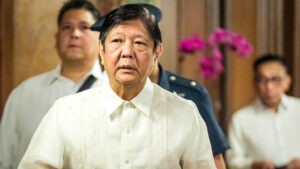
Marcos told to prioritize key issues over ‘Cha-cha’
By Kyle Aristophere T. Atienza, Reporter
THE PHILIPPINES’ largest business group has called on the government of President Ferdinand R. Marcos, Jr. to work on lowering energy and logistical costs as well as deal with geopolitical risks instead of creating political instability by pushing changes to the 1987 Constitution.
The Philippine Chamber of Commerce and Industry (PCCI) also cited the slow progress in the country’s anti-corruption fight and the political squabble between the President and his predecessor Rodrigo R. Duterte, which it said is undermining the country’s image on the global stage.
Rising energy and shipping costs and worsening geopolitical conflicts are hurting Philippine businesses and making the country unattractive to foreign investors, PCCI Chairman George T. Barcelon said by telephone.
“All these costs, we can see a steady increase in the trend,” the businessman said. “These issues should be addressed first before Charter change (‘Cha-cha’).”
The outlook for Philippine energy is bleak as the Malampaya gas field gets depleted by 2027. Malampaya, whose supply is expected to dwindle this year, is the Philippines’ only indigenous source of natural gas.
Output loss is expected to result in 12- to 15-hour rotational brownouts across the main island of Luzon.
Meanwhile, tensions in the Red Sea, a major global shipping route, have remained elevated as Iran-backed Houthi rebels continue to attack cargo ships and tankers amid the conflict between Israel and Gaza, affecting the movement of goods globally and driving shipping rates up.
Philippine Economic Zone Authority Director-General Tereso O. Panga earlier said rerouting ships around the Red Sea could make shipping costs 15% more expensive due to additional fuel per trip between Asia and Northern Europe.
He also said rising fuel prices spurred by wars including Russia’s invasion of Ukraine, and El Niño that is is expected to last until the second quarter is affecting Philippine farm output.
Philippine inflation averaged 6% in 2023, the second straight year that it breached the central bank’s 2-4% target.
Senators and congressmen continue to trade accusations amid the push to amend the Constitution, and the President and his wife have been dragged into the mess.
The Senate has rejected a so-called people’s initiative for Charter change, which Mr. Duterte and his allies have linked to Mr. Marcos and his cousin Speaker Martin G. Romualdez.
The Commission on Elections on Monday suspended proceedings on the initiative, which senators led by presidential sister Maria Imelda “Imee” Marcos are investigating.
“What is the extent of this ‘Cha-cha?’” Mr. Barcelon asked. “We don’t see any new specific issues that this Charter change seeks to address,” he added, noting the business community is wary about where it is headed.
He said the country in recent years has relaxed restrictions in many sectors without constitutional amendments.
‘NOT HELPING’
He cited changes to the Public Service Act in 2022 to allow full foreign ownership in key domestic sectors including airports, railways, subways, tollways, telecommunications and domestic shipping, as well as amendments to the Retail Trade Liberalization Act that lowered the minimum paid-up capital requirements for foreigners.
Mr. Marcos on Tuesday night said his government is after economic provisions of the Charter. “We have been in continuous discussion with both Houses in recent days. In fact, I met with our legal luminaries and tried to find a way because I’m really after the economic provisions,” he told reporters while on a state visit to Vietnam.
The “Cha-cha” push is also a source of tension between Mr. Marcos and Mr. Duterte, who on Sunday accused him of being a drug addict.
National Economic Development Authority Secretary Arsenio M. Balisacan on Wednesday said political instability is bad for the local investment climate.
Mr. Marcos and his predecessor’s daughter Sara Duterte-Carpio ran in tandem in the 2022 elections under a platform of unity.
“There has to be a cease-fire,” Mr. Barcelon said. “We have a former and a present leader talking about those topics, and we think it projects the wrong image for our country. It’s not helping any, especially at a time when we face headwinds.”
He also lamented the slow progress in the fight against corruption.
Philippines ranking in Transparency International’s 2023 Corruption Perceptions Index inched up one spot to 115th out of 180 countries, while its score remained at a record low.
“We have not improved a lot,” the PCCI chief said. “It shows that corruption is still an issue. When you talk about the issue of ease of doing business, that can be translated into both the bureaucracy and, on the flip side, corruption.”
“That has also always been on the mind of various business groups.”
Mr. Barcelon said Vietnam has attracted foreign direct investments (FDI) despite foreign ownership restrictions in some of its key sectors.
Vietnam had FDIs worth $112 billion from 2010 to 2019, compared with $57 billion for the Philippines. Its merchandise exports in 2019 hit $300 million, compared with $70 million for the Philippines.
“We have all the conditions to attract FDIs,” the businessman said. “But somehow, it’s a matter of perception. And this political squabble is affecting our image. It’s causing uncertainties.”
“There are other aspects that we know very well have been there. Our logistics costs are one of the highest. Our energy costs are also among the highest. In the immediate term, these issues must be addressed,” he added.



